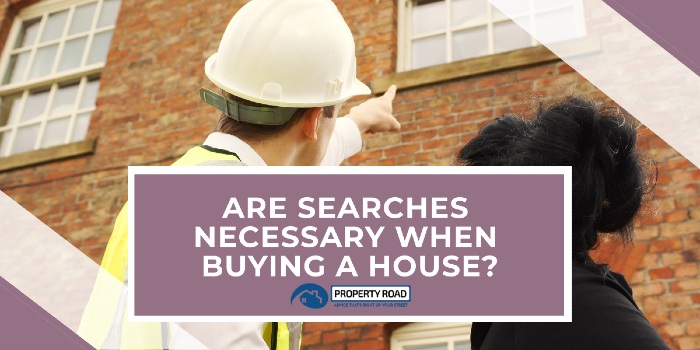Are searches necessary when buying a house? It’s a question that many buyers have, especially given that you have to pay for them as part of the solicitor’s fee.
You might be disappointed to hear that the answer is yes. Property searches are a crucial and necessary part of the conveyancing process – even though they are not a legal requirement.
If you are a cash buyer, you can decide not to carry out searches, although your conveyancing solicitor will recommend that you still do them as they will give you vital information about the property and land you are buying.
However, if you are buying a property with a mortgage, the likelihood is that your lender will insist that you carry out the searches.
So let’s look at what searches actually are and why they are so important.
Buying A Property? FREE Step-By-Step Platform
Property Searches: What Are They?
Property searches are basically reports about specific issues in the area that might affect the property. They aren’t concerned with the property itself, but with the land and surrounding areas.
Your conveyancing solicitor will order these searches from various local authorities, which will carry them out and send a report back.
Different searches will bring up different issues:
- Mineworks: If your home is in a former mining area, you will want to know about the potential of a mineshaft collapsing
- Your home may be demolished to make way for a new road, or there could be plans for a pylon or a wind farm next door which could affect the property’s price
- Being liable to flooding regularly means you may struggle to find home insurance
- Your property may have been built on contaminated land – such as industrial waste including asbestos
Your solicitor will scrutinise these reports and let you know if there is anything you need to know. And if it brings up any issues, they can advise you what can be done to counteract the problem, if possible.
Why Property Searches Are Essential

Searches cover a wide range of potential issues that could impact on the property value and your enjoyment of your new home. For example, the searches might show that a new housing development has been given planning permission in the field behind your house.
You might have decided to buy this house because of the nice views out of your bedroom window. You won’t be happy if one day they suddenly start building new houses. Apart from the loss of view, you will have to put up with the noise of a big building site.
Once you bought the house, there is nothing you can do about it, apart from selling it again. But it will be more difficult to sell it while there is a big building site behind it, and it might also affect the price. A search can warn you about issues like this, so you can evaluate your decision based on this new information.
Searches can uncover different issues that could turn your dream home into a nightmare. That’s why they are necessary when buying a house.
If you are a cash buyer, this is the reason why you should do searches, even if you aren’t legally obliged to do them. And your solicitor will always advise you to carry them out.
So don’t be tempted to try and save money by not carrying out a full search. This will be a false economy should there be a serious issue that will be revealed with a search.
Carrying out the searches will help you make an informed decision about investing money in a property and protect you from future issues.
When buying a property with a mortgage, you don’t really have a choice. Your lender will insist on having searches done, as they are looking to protect their investment.
They will tell your conveyancing solicitors which searches they want carrying out. If you refuse, they won’t lend you the money. It’s as simple as that.
So while searches add to the conveying costs, there are very good reasons why they need to be done before you buy a property.

Our current home is in a county with many areas that are in risk of flooding and do flood every year. We knew that being in a flood-risk area could make getting insurance difficult, or at least expensive.
So the flood risk search was vital for us. Thankfully, it showed that our property actually wasn’t in a risk area, even though we are quite close. And our village does flood every year, even if not as bad as some other areas.
What did also give us peace of mind is that the search also showed that even in the long-term, our property is unlikely to flood. As you can see, for us, this search was vital. Because if the results had been otherwise, we would have to consider our decision.
Which Search You Need Will Depend On The Property
Are searches necessary when buying a house? Yes they are, as we have seen. But do you need them all or if not, which ones do you need?
Because of the reasons we stated before, it is vital that you know as much as possible about your property, land and surrounding areas before you exchange contracts. But that doesn’t mean you need them all.
Generally speaking, there are four searches that a solicitor will order for every purchase, as they provide information that are relevant for every buyer:
- Local authority – covers building control, highways, planning and pollution issues
- Environmental – covers contaminated land, subsidence, flooding and landslide issues
- Water and drainage – covers everything around water supply and sewer drainage
- Land registry search – to check the seller legally owns the property
These searches are done as standard, but others might be necessary depending on where your property is located. Your solicitor will advise on which other searches should be carried out.
And we would recommend that you listen to their advice, given how important it is to know as much as possible about the property you want to buy.
Other searches that your solicitor might advise you to carry out include:
- Flooding search/flood risk search
- Mining search
- Radon search
- Chancel search
- Title register/title plan
- bankruptcy search
Not all searches will be necessary for every property. Your solicitor might know that it isn’t a past coal mine area, because they have overseen the conveyancing of other properties in this area. So they might not deem a mining report necessary.
When we bought our current home, the owners told us that they installed a positive pressure vent because they had high radon levels in their previous home.
Radon is a radioactive gas that occurs naturally in every home in the UK.
The levels will depend on the ground the house is built on. In some areas the levels are quite high and remedies such as installing a positive pressure vent might be necessary. A radon search will check the levels in the area.
You can also check the government’s free radon map, if you are unsure if you need this search.
Rather than carry out the radon search, the previous owners decided to put in the positive pressure vent. For us, this meant we didn’t need to carry out this search either.
Conclusion – Are searches necessary when buying a house?
As we have seen, the answer is absolutely. A search will either highlight a potential problem that may save you money in the long term or reveal there are no issues to worry about.
So even though you are not legally obliged, especially if you are a cash buyer, to carry out any searches, we would recommend to still do them because they are very important. It might save you from making a big mistake.
It may also throw up an issue that you can take back to the seller, so you can ask them to lower the price or undertake remedial action.
More information
Your estate agent will probably recommend a conveyancer, but a good place to check and find a reputable conveyancing solicitor is to use our handy comparison tool.
If you have more questions about property searches, head to our FAQ page about this topic.





